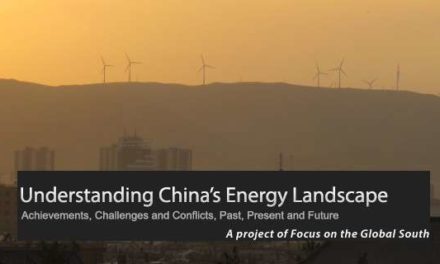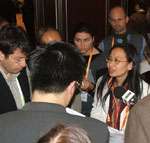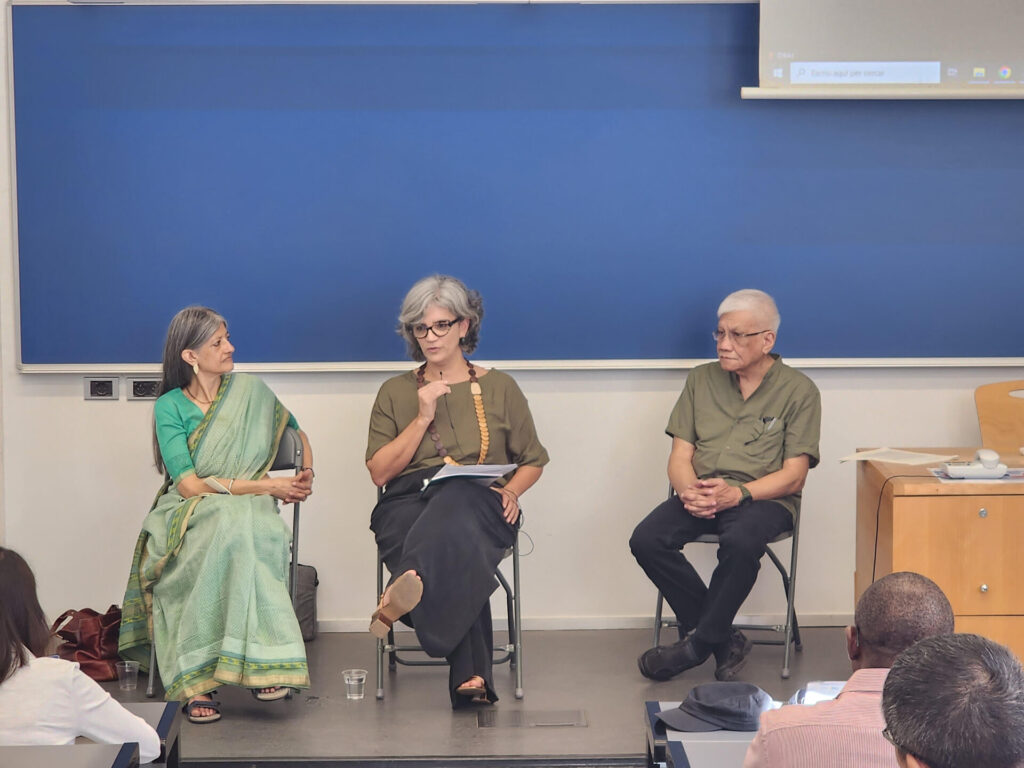
From left to right: Prof. Jayati Ghosh of University of Massachusetts at Amherst, Prof. Simone Deos of the State University of Campinas in Brazil, and Walden Bello at the panel on the crisis of multlateralism.
The recent unilateral strikes by the US on Iran’s nuclear development sites underline the fact that multilateralism is dead, and has been so for some time.
It is not only when it comes to the question of the deployment of military power that multilateralism is shown to be dead or dying. The key institutions of western-led globalization are no longer functioning or are in sleep mode. This was brought home by the US government’s decision to boycott both the Finance and Development Summit in Seville, Spain, this week, and the Bonn Climate Summit two weeks earlier.
The World Trade Organization has never recovered from the collapse of the Fifth Ministerial in Cancun in 2003, with the United States, in fact, taking the lead in emasculating it by preventing appointments to its decisive unit, the appellate court.
There has been stiff resistance at the IMF and World Bank to change the shares of voting power to give the China, the other BRICs, and other countries in the Global South the weight they deserve in the changing global balance of economic power. For over four years now, since the end of the G-20 debt suspension initiative, even as many countries in the Global South lapse deeper into a debt crisis worse than that of the 1980’s, no new effort at addressing the problem has come from the Global North. Instead, the Paris Club has played a blame-game, accusing China of not joining a common front vis a vis the indebted countries.
As for climate finance, despite a conciliatory retreat by the Global South like the Bridgetown Initiative spearheaded by Barbados by folding development into climate finance, the $58 billion delivered after years of difficult negotiations is puny compared to the $1 trillion needed annually for the loss and damage inflicted on the Global South by the climate-destructive activities of the main climate polluters. And with a climate denialist administration now in the saddle in Washington, DC, the other leading climate criminals have been provided the excuse not to add to the commitments to the already weak, voluntary ones they have made. The UNFCCC or Climate Summit will meet in Belem, Brazil, in November, but the reality is that negotiations are dead in the water.
Death of a Grand Strategy
The United States has been decisive in this retreat from multilateralism, and this process unfolded long before the advent of Donald Trump. It is Trump, however, who has cut the cant, shed the hypocrisy, and sounded the death knell on the grand strategy of liberal internationalism that served as the United States’ guiding strategy over the last eighty years, where it was committed to engaging threats to US capital and US state power where ever they were threatened globally. As Viktor Orban, the European figure most admired by Trump has noted, his fellow strongman’s plan is to retrench to the Americas, focusing on reinvigorating the imperial heartland, North America, while strengthening the US grip on Latin America in an aggressive reiteration of the Monroe Doctrine. And Orban adds, “there will be no more export of democracy.”
Trump may seem unpredictable, but there is a trend line cutting across the zigs and the zags. He is simply recognizing what his predecessors refused to see—that the empire is overextended and no longer has the resources to sustain its multiple engagements. Moreover, he is responding to the most significant and powerful section of his Make America Great Again Base. This movement is a product of the four decades-long crisis of capitalism and imperialism. From a progressive standpoint, it has a number of contradictory features. It is, to use Althusser’s term, an “overdetermined contradiction” that combines the worst racist, ethnocentric, and anti-intellectual impulses with deep disdain for the neoliberal, pro-globalization initiatives and interventionist, warmongering policies of the liberal and neoconservative internationalists that have controlled policymaking over the last 80 years. It is fascism, but unlike in the 1930’s, it is inward-looking, not expansionist fascism.
What is emerging is an imperialism that is on the defensive, with the priority being the setting up of tariff walls against foreign imports, adopting harsh measures to prevent the entry of non-white migrants and expel undocumented workers, uprooting the global supply chains set up by US transnational capital and reshoring or bringing back their productive facilities to the US, and, last but not least, divorcing the US completely from collective efforts to address the climate crisis. The MAGA program espoused by ideologues like Peter Navarro, Vice President JD Vance, Tucker Carlson, and Steve Bannon is very popular, though to orthodox economists, it is madness.
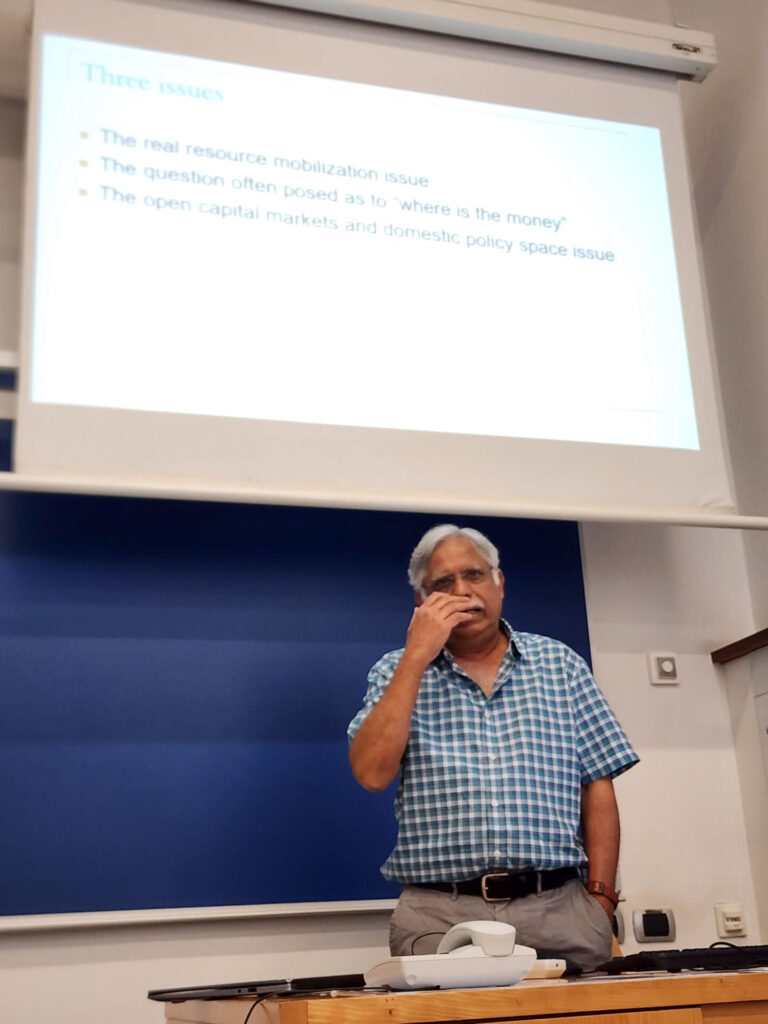
Prof CP Chandrasekhar of JNU University in New Delhi speaking on domestic resource mobilisation for development.
It is likely that we are entering an era of geoeconomic competition emerging whereby free trade and the free movement of capital are being replaced by close cooperation between national capital and the state to limit foreign penetration of the domestic market and prevent the acquisition of advanced technology, especially artificial intelligence (AI), by rival corporate- state actors. This is, as was pointed out during the first day, industrial policy with a reactionary vengeance. In the case of Trump, the preferred methods of dealing with the Global South are unilateral economic actions rather than multilateral initiatives via the Bretton Woods institutions, and unilateral military strikes rather than joint assaults under NATO, such as the recent attacks on Iran, and definitely no boots on the ground.
Nature, it is said, hates a vacuum. With the US-dominated global multilateral system dead in the water, many in the Global South are scouting around for alternative sources of economic and political assistance. Among the candidates is the formation known as the BRICS (Brazil, Russia, India, China, South Africa) which is backed by something that the G77, for all its virtues as a site of alliance building for the developing countries, lacks: economic clout.
Rise of the BRICS
The BRICS developed institutionally in a gradual fashion. The New Development Bank (NDB) and the Contingency Reserve Arrangement (CRA), which were conceived as performing functions akin to the World Bank and IMF respectively, were formed in 2015, but they remained relatively low profile, perhaps so as to assure the West they were not meant to supplant these key institutions of the western-dominated multilateral system as well as discourage developing countries to think of them as major alternative sources of development and emergency finance. As of the end of 2021, the cumulative lending of the NDB came to only nearly $30 billion, a fraction of World Bank lending for the period 2015 to 2021.
As of January 1, 2025, Egypt, Ethiopia, Iran, Indonesia, and the United Arab Emirates (UAE) had joined the original five members. The 10-country formation boasts a total population covering over 40 percent of the world. They also have a substantial 28 percent share of the global economy, equivalent to $26.5 trillion.
That so many countries, including Thailand and Malaysia, are queueing up to join the BRICS club, indicates that the Global South realizes that the scale is steadily tipping against the West, which has grown increasingly defensive, grouchy, and insecure.
A number of current and prospective members have significant surplus funds potentially available for development lending. Aside from China’s massive resources, the UAE has $2.23 trillion in its sovereign wealth fund. Saudi Arabia, which has delayed its membership but is expected eventually to join, has $1.3 trillion in its fund. These sums could potentially bolster the firepower of the current Contingent Reserve Arrangement and the New Development Bank.
Are these hopes for the BRICS exhibited by many in the Global South realistic?
First of all, let me acknowledge that the BRICS, especially China, have played a major role in moving the balance of global economic power vis a vis the North to a tipping point. Let me also say that China, in particular, has, over the last quarter of a century, provided many countries in the Global South a source of alternative finance, thereby opening up more development space. As progressive economist Kevin Gallagher has pointed out, China is now the world’s biggest development bank. This has elicited much negative feeling in the West. While there are certainly flaws in China’s lending activities, there are so many lies being floated by western sources, like the claim that China is steering many countries into a debt trap. This is IMF-instigated crap. Chinese aid is not disinterested, but it does not have the crippling conditionalities that accompany IMF and World Bank assistance.
Grounds for Caution
Still there are grounds for caution. The BRICS institutional mechanisms for delivering assistance are, as pointed out earlier, relatively underdeveloped. It is not only the scaling up of assistance-delivery systems that is in demand. Among the expectations of many of those queuing up to join is that the decision-making processes in these instiutions would be more participatory and democratic than those of the western-dominated agencies. So one big question is: Are the key actors in the BRICS going to be open to sharing decision-making power over their resources?
A related question is: The leading forces in the BRICS are a mix of authoritarian and formally democratic states; is it not realistic to expect that they will bring their regime preferences and styles of governance to a multilateral setting?
It is important to remember in this regard that this year is the 70th anniversary of the iconic Bandung Conference. The Global South has travelled a long way in terms of decolonization and, especially in the last seven decades, in terms of coming close to the tipping point in the global balance of power vis a vis the Global North. But it is useful to recall that the Bandung Declaration was not just a document promoting political and economic decolonization. Indeed, the very first of the ten points of the Declaration was “Respect for fundamental human rights and for the purposes and principles of the charter of the United Nations.” Two of the key movers in Bandung were India and China, who play central role in the BRICS. Nehru and Zhou En Lai were exemplary voices of the Global South in 1955, when decolonization was the burning issue. However, when it comes to the first Bandung principle, their governments today are not exactly paragons of human rights. India today is ruled by a Hindu nationalist government that considers Muslim second-class citizens. Beijing is accused of carrying out the forcible cultural assimilation of the Uygurs, though there might be exaggeration of this process by the West. As for the other key sponsors of the Bandung meeting, the military regimes in Myanmar and Egypt are notorious for massive human rights violations.
Indeed, most states of the Global South are dominated by elites that, whether via authoritarian or liberal democratic regimes, maintain problematic social and economic structures. The levels of poverty and inequality are shocking. The gini coefficient for Brazil is 0.53, making it one of the most unequal countries in the world. That for China, 0.47, also reflects tremendous inequality, despite remarkable successes in poverty reduction. In South Africa, the gini coefficient is an astounding 0.63, and 55.5 percent of the people live under the poverty line. In India, incomes have been polarizing over the past three decades with a significant increase in bilionaires and other high net worth Individuals.
The reality is that the vast masses of people throughout the Global South, including indigenous communities, workers, peasants, fisherfolk, nomadic communities and women are economically disenfranchised, and in liberal democracies, such as the Philippines, India, Thailand, Indonesia, South Africa and Kenya, their participation in democracy is often limited to casting votes in periodic, often meaningless, electoral exercises. South-South investment and cooperation models such as the Belt and Road Initiative and free trade agreements frequently entail the capture of land, forests, water and marine areas and extraction of natural wealth for the purposes of national development. Local populations – many of who are indigenous–are disposessed from their livelihoods, territories and ancestral domains with scant legal recourse and access to justice, invoking the specter of home grown colonialism and counterrevolutions.
I bring this all up to emphasize two points: 1) that while we must recognize the role of the Global North in the perpetuation of poverty and inequality in the Global South, much of our current condition is the creation of our own elites; 2) that democratic governance at the global level cannot be delinked from democratic governance at the local level.
Capitalism and Multilateralism
There is a third, not minor, consideration when it comes to assessing the future of the BRICS, and here it is useful compare Bandung’s historical moment to that today. At the time of the Bandung Conference, the political economy of the globe was more diverse. There was the communist bloc headed by the Soviet Union. There was China, with its push to move from national democracy to socialism. There were the neutralist states like India that were seeking a third way between the communism and capitalism. With decades of neoliberal transformation of both the Global North and the Global South, that diversity has vanished. Perhaps the greatest obstacle to a new, equitable global order is the fact that all countries remain embedded in a system of global capitalism, where the pursuit of profits remains the engine of economic expansion, both creating great inequalities and posing a threat to the planet.
The dynamic centers of global capitalism may have moved, over the last 500 years, from the Mediterranean to Holland to Britain to the United States and now to the Asia Pacific, but capitalism continues to both penetrate the farthest reaches of the globe and deepen its entrenchment in areas it has subjugated. Capitalism continually melts all that is solid into thin air, to use an image from a famous manifesto, creating inequalities both within and among societies, and exacerbating the relationship between the planet and the human community. Whether market-driven, developmental, or state capitalist, the same dynamics of surplus extraction, with massive planetary externalities, cut across these variants of capitalism.
Can we move towards a new, more participatory system of multilateralism without bringing forth a post-capitalist system of economic, social, and political relations? I do not believe in determinism or that we are doomed to repeat the experience of the West. I think it is very positive that the hegemony of the North is breaking up and that the multilateral system it set up to dominate the Global South is breaking down. I think that rather than try to fix that system, we should orient our actions to the strategic objective of breaking it up, using a mix of negotiation, promoting a radical counter-agenda, and coercion as complementary weapons.
Derail Seville and Belem but…
With the US pulling out of the Finance for Development process and boycotting the pre-COP 30 meeting in Bonn, we must not allow the Europeans to save multilateralism in Sevilla and Belem. We must use those assemblies to further discredit it.
But we should not fool ourselves into thinking that replacing it will be easy and that there will be no setbacks and derailments in this process.
Let me end by invoking that phrase from the Italian Marxist Antonio Gramsci that you all are familiar with because it so apt in describing the times we live in and its challenges: ““The old world is dying, and the new world struggles to be born: now is the time of monsters.” We can’t get to the safe harbor without taking great risks, and there is no assurance that, like Ulysses, we will get past the proverbial monsters of Scylla and Charybdis.
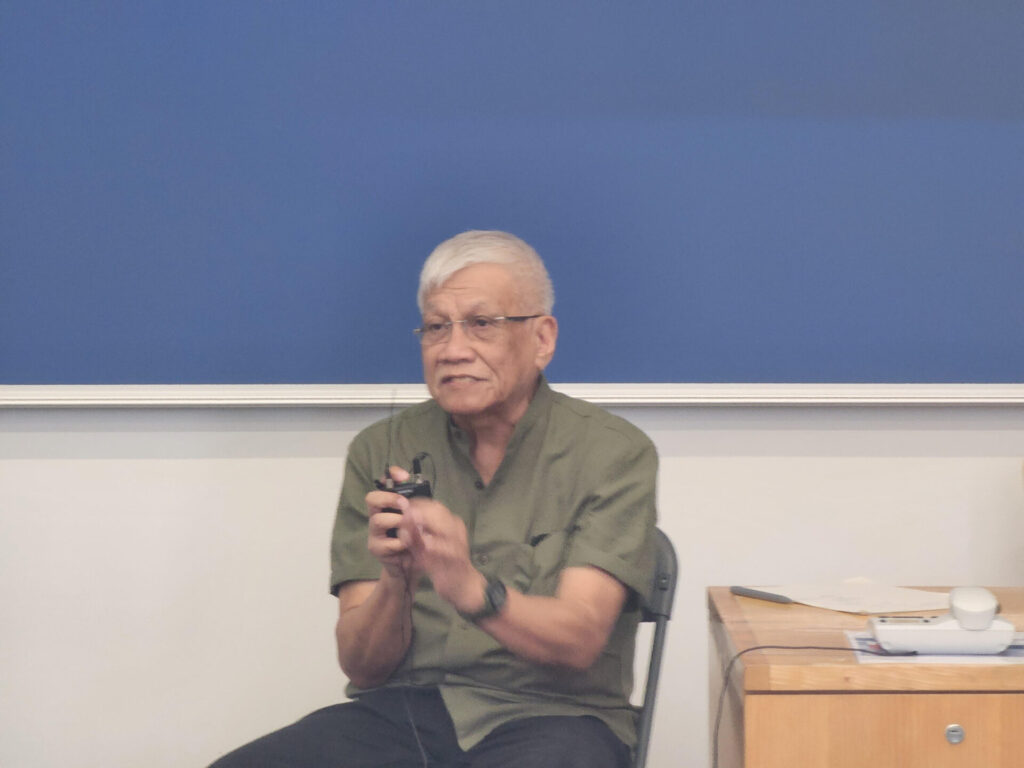
*Walden Bello is Co-Chair of the Board of the Bangkok-based research and advocacy institute Focus on the Global South that is affiliated with the Chulalongkorn University Social Research Institute. This article is based on his comments at the IDEAs Conference “Time to Pivot: Financing for Development (FID) in a New Era” held in Barcelona, Spain, June 26-28, 2025. The conference was timed to provide input for the Fourth Financing for Development Summit in Sevilla, Spain, held from June 30 to July 4, 2025.



